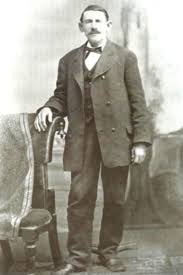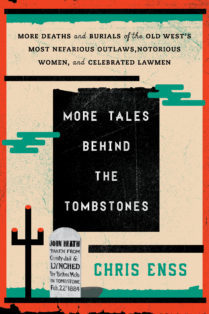Enter now to enter to win a copy of More Tales Behind the Tombstones: More Deaths and Burials of the Old West’s Most Nefarious Outlaws, Notorious Women, and Celebrated Lawmen

“No matter where people go, sooner or later there’s the law. And sooner or later they find God’s already been there.”
—John Wayne as John Chisum in Chisum (1970)
Cattle barons of the vast frontier such as John Chisum once held undisputed sway over the great public domain. He ruled like a lord of old over the Pecos country in New Mexico where desperate battles were fought between rival cattle barons for more grazing land.
Rancher John Simpson Chisum was born into an affluent family in Tennessee on a plantation on August 16, 1824. His parents relocated their five children to Red River County, Texas, in 1837. John was thirteen when his family settled in Paris, Texas. He worked a series of odd jobs before becoming the county clerk in 1852.
At the age of thirty, John ventured into cattle ranching with Stephen K. Fowler, a businessman from New York. The Half Circle P brand, owned by Chisum and Fowler, was seen on livestock across a great expanse of the land John purchased in Denton County, Texas. Stephen’s original investment of $6,000 resulted in a $100,000 profit in ten years.
Chisum used his portion of profitable shares to buy more land and cattle. In addition to running his own spread, which included five thousand head of cattle, John also managed livestock for other ranchers and ambitious investors. By 1861, John Chisum was recognized as one of the most important cattle dealers in North Texas.
When the Civil War started, John contracted with the military to supply beef to soldiers in the Trans-Mississippi Confederate Army Department. After the war he drove his cattle into eastern New Mexico to sell to the government for the cavalry and the Indian reservations. In 1867, John moved his base of operation to Roswell, New Mexico, where he already had more than one thousand head of cows. He established a series of ranches along a 150-mile stretch of the Pecos River. John’s empire grew to eighty thousand head of cattle and he hired more than one hundred cowboys to work the livestock.
John Chisum was involved tangentially with the Lincoln County Range War in 1878. The dispute initially began as a fight between cattlemen and two store owners over who rightfully controlled the trade of dry goods in the county. Cattlemen John Tunstall and his business partner, Alexander McSween, owned one of the stores, and they were being threatened by the owners of the competing establishment who had an economic stranglehold on the area. Each store owner organized his own men to protect his enterprises and homes from being overrun. Tunstall and McSween had in their employ Billy the Kid and his associates. John Chisum supported Tunstall’s efforts. His exact role in the dispute is unknown.
After Tunstall was murdered, Billy the Kid took Chisum to task over money he insisted John owed him for protection. Chisum disagreed, and Billy resented him for it. In 1880, Chisum helped get Pat Garrett, the sheriff who shot Billy the Kid, elected to office.
John Chisum’s cattle operations continued to thrive, and he shared his good fortune with his brother, James. John gave James his own herd of cattle to manage.
John contracted throat cancer in late 1883 and had surgery to remove the growth in 1884. He died on December 22, 1884, in Eureka, Arkansas, where he had been recuperating from the operation. His giant cattle empire was worth $500,000. Chisum never married, but it is believed he fathered two children with one of the slave women he owned named Jensie.
John Chisum’s body was laid to rest in Paris, Texas. He was sixty years old when he passed away.

To learn more about how some of the Old West’s most legendary characters died read More Tales Behind the Tombstones: More Deaths and Burials of the Old West’s Most Nefarious Outlaws, Notorious Women, and Celebrated Lawmen

